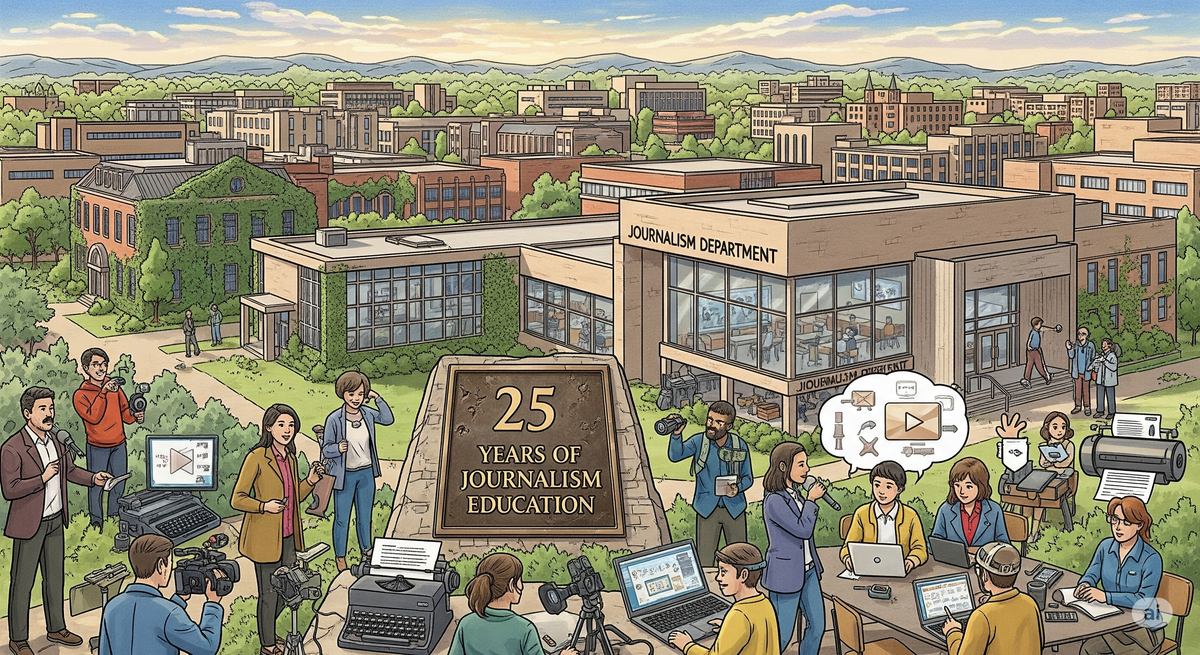25 years of journalism teaching
This coming academic year will be my 25th academic year. Here are a few observations on universities and journalism at university.

I’ve been getting round to rounding off this year and starting to prep for the next academic year. I’ve realised that this year will be my 25 academic year teaching on journalism courses at universities. The exact time I started is a bit hazy. I moved to the Department of Journalism at UCLAN in 2000. How I found myself there is another story. But it seems like a good time to reflect a little
So I thought I’d put together some briefish observations that have struck me as I pondered the last 25 years. I may have more...
How universities work.
I've learned a lot about how universities work (and don’t work) in 25 years, and there are two consistent takeaways
Universities are two separate entities working together. One is the body that does the teaching and research. The academic stuff. The other is the one that manages the resources and systems - central services, buildings, etc. One is no less important than the other. There’s no hierarchy. Working together is what makes a university. But there’s a style of management in many universities that forgets that and equates management of one with successful management of the other. My experience of this is that it tends to manifest itself as an over-reliance on systems and data. It means a focus on delivering KPI's against centralised services and seeing that as the target. The best managers I’ve worked with understand that you need to consider both and recognise how each part is different and communicate accordingly.

Universities generate a lot of shit - sometimes it’s just what’s left from the day-to-day decision making. You make a call, and there’s stuff to clean up! Other times it’s there because of the large amount of shit that is dumped on universities from everywhere - I’m looking at you, governments (past and present). But the result is that at the heart of every university is a big pile of shit that needs to be managed. The killer is that the yearly churn and changing winds of HE mean there's effectively a giant fan next to that pile of shit. It constantly blows the shit around. The best of senior management will look to minimise the amount of new shit and maybe even get rid of some of the existing pile. Some will just seek to spread it around so it looks smaller and minimises the spread. Others will add to it and then cut and run before that shit hits the fan. Especially if that shit is financial. The best I’ve learned to do is when you feel the breeze pick up, try and get behind the fan!
Teaching Journalism in universities.
Journalism is a weird fish in the university lake. Perhaps the weirdest. Show me a journalism academic who has been in a university for more than five years, and I bet they’ve seen at least one change of department/name/hierarchy. We pop up in weird places: business schools, arts faculties, communications. You name it, journalism has probably been there at one time or another, bundled in with other courses.
What’s clear is that the way we teach and assess journalism doesn’t neatly fit anywhere. We don’t do a lot of essays and exams like traditional academic courses, and our demand on resources doesn’t quite fit the pen/paper/library/book model that universities use to box in humanities courses. But our practice-based assessment and teaching sit uncomfortably with other practice-based courses. In the eyes of arts courses, we often aren’t critical or creative enough compared to other parts of their provision. We’re not technical enough for technical courses.
A big part of this is that universities move very slowly when it comes to pedagogy. I’m still surprised by the amount of structure that is in place, which is built on the concept of progression to a higher academic/research-based award. You too, could eventually get your PhD and become an academic!
Now I don’t have an issue with academic progression - some of my best friends are academics! There’s an amazing and growing number of journalism tutors gaining PhD’s now. They are amazing! But it’s not the only route, and the academic life is certainly not one that is attractive or made easy by the universities themselves (see fan-assisted pile of shit above).
What it often comes down to are teaching and assessment regulations that are buried in thinking from the 60s or in financial models that stem from the heady days of UG recruitment (especially for post 92 unis where a lot of journalism courses thrive). These still drive a lot of how universities work, from academic regs to resourcing to timetables. It also drives thinking around academic progression, especially from UG to PGT.
I think the nub of this is that universities still haven’t got a handle on vocational courses. Employability is at the heart of everyone’s thinking, and degrees do prepare you for employment. No argument from me. But there’s a difference between transferable skills and hands-on, usable skills targeted at industry. I know that’s a generalisation. But any journalism lecturers who’ve been through course validation, where you need to defend teaching and learning strategies to colleagues, will understand how hard it can be to sell the distinction and the value.
There’s also a large part of this which comes down to how journalism itself is perceived. I’ve certainly been in the room (more than once) where it’s generally accepted that studying the output of journalism is seen as more academically acceptable than learning how to do it. Learning how to do x form of analysis on newspaper articles is more valuable than understanding the process of how articles are written. That might seem like a snarky generalisation (sorry!). All respect to those doing analysis or whatever other methodological approach you take. But in all seriousness, look at how many research articles analysing journalism cite sources from the 60s and 70s. Cough. Galtung and Ruge. Cough. And don’t get me started on the discourse around “Research-informed teaching”.
But we can’t let industry off the hook here. For everyone but those in it and around it, the perception of journalism and its value is measured by its output and impact. Over 25 years, there have been times when I have honestly despaired at what the industry leaves us to work with. The times I’ve looked at some coverage and thought, "this has just made my job teaching and defending journalism harder" How can we get students and colleagues in academia to respect journalism for what it is and how we do it if the industry throws that against the wall for short-term gain?

So, as much as we see it as a USP, the value that comes from the employability/industry relevance of journalism courses is also a deeply rooted problem. We stand with one foot firmly planted in industry, the other in academia. It can make for a tricky balancing act at the best of times. I’ve been through periods where one or the other is in crisis - the internet, dot-com bubbles, student fee debates, AI... But over the last few years, the disruptive waves of academia and industry have slipped into phase. We are in extremely perilous seas as an industry and the industry it serves.
Still going...
What do we do about all or any of that? Truth be told, even after 25 years, I don’t know.
I’d dearly like industry to do better. To understand that trust, in particular, is not an infinite resource. Many parts of the industry are burning through it for profit, blind to the irreversible climate change they are creating.
I'd also like universities to do better. To value teaching as something more than simply the alternative to research. I’d like to see the centre shift to properly encompass all of what makes a university and be more open to the differences in learning and teaching, rather than trying to get everything to fit an off-the-shelf system.
However, what I do know is that I still love the permission to explore and explain, and sometimes innovate. I’m professionally curious and still recognise, respect and value the space that university has given me to be that. I also see the creativity and capacity (and desire) for learning and change in the industry that makes it a great place to test that curiosity. The journalism industry I see is not the industry a lot of academics see.
So, I may not have another 25 years in me (for which many would be grateful). And it’s certainly not always going to be comfortable - If I'm honest, I’m glad I’m at this end of 25 years! But I’m lucky to be going into this academic year still excited by a lot of what I do.
